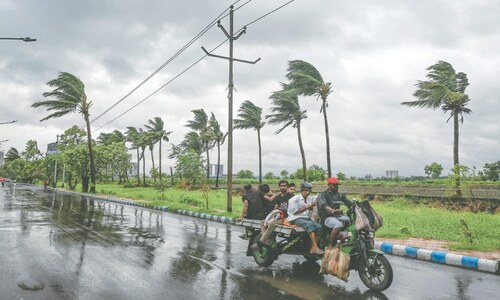MUMBAI: An American jailed in the Unites States for helping plot the November 2008 deadly attacks here told an Indian court on Monday that militants had made two failed attempted attacks on the city before killing 166 people in the incident.
David Headley, who was sentenced in 2013 by a Chicago court to 35 years in a prison for his role in the attacks, said militants from the Lashkar-e-Taiba (LeT), a group banned in Pakistan, had been behind the fatal assaults.
“In the month of September 2008 and in October 2008 those attempts by the LeT were unsuccessful on account of accident to the attackers,” Indian public prosecutor Ujjwal Nikam said, citing Headley’s testimony via video link.
Headley, 55, was giving evidence to a special Indian court from an undisclosed location in the US.
The court is trying suspected plotter Sayed Zabiuddin Ansari, also known as Abu Jundal.
In December it pardoned Headley on condition that he testified. The pardon does not affect the US sentence.
Mr Nikam, who questioned Headley for nearly five hours, said he had also claimed meeting a “Major Iqbal” and “Mr Ali” who the American said were serving with a Pakistani spy agency.
Headley, the son of a former Pakistani diplomat, was sentenced after admitting scouting targets for the Mumbai attackers.
After initially denying involvement, he confessed and cooperated with US authorities to avoid the death penalty.
Mr Nikam said Headley had told the Indian court he had joined the LeT in 2002 and received two years of “military training”, including “in handling sophisticated weapons like AK47s”.
He added that Headley had said that he had received training from LeT founder Hafiz Saeed and Zakiur Rehman Lakhvi, the alleged mastermind of the attacks.
Headley said he had travelled to India seven times to scout potential targets the militant group and supplied his handlers in it with videos and maps of luxury hotels, a Jewish centre and the city’s main railway station that were attacked,
According to Mr Nikam, he told the court that in one botched attempt, a boat in which attackers were travelling overturned after hitting rocks and their weapons were lost at sea.
He said his name was Dawood Gilani, but he had changed it to David Coleman Headley in 2006 to facilitate his travel to India.
Mr Nikam said he had used his US passport to travel frequently to India without raising suspicion.
Published in Dawn, February 9th, 2016














































Dear visitor, the comments section is undergoing an overhaul and will return soon.